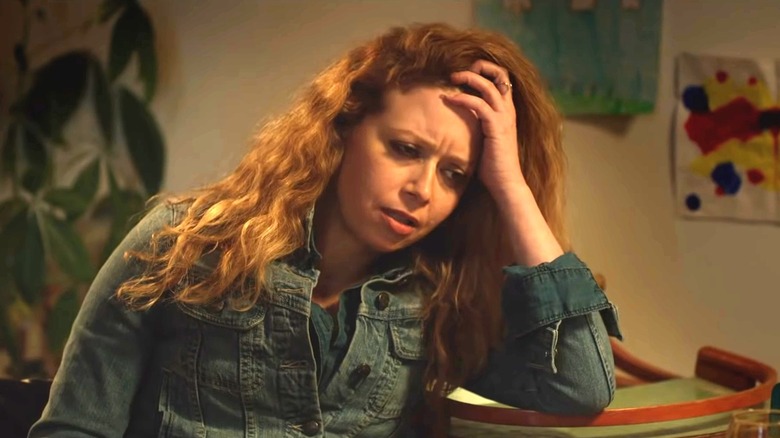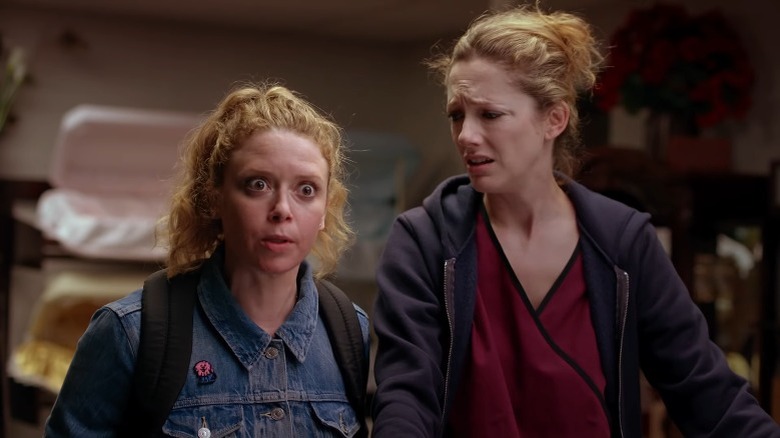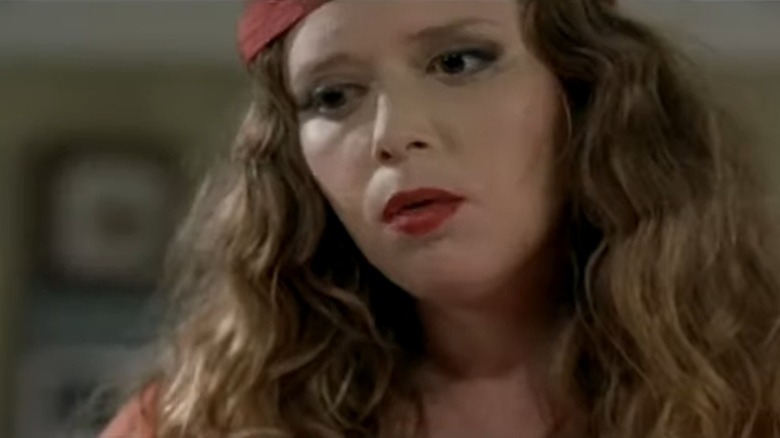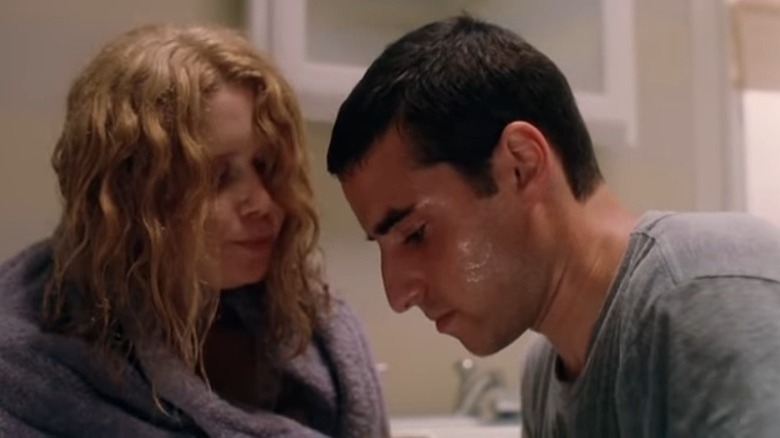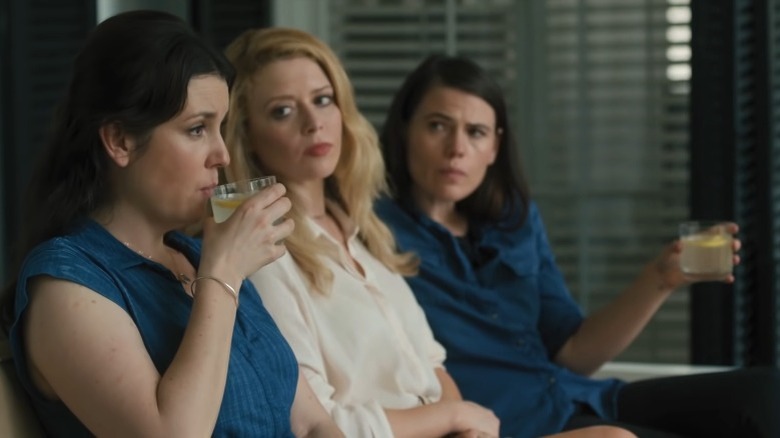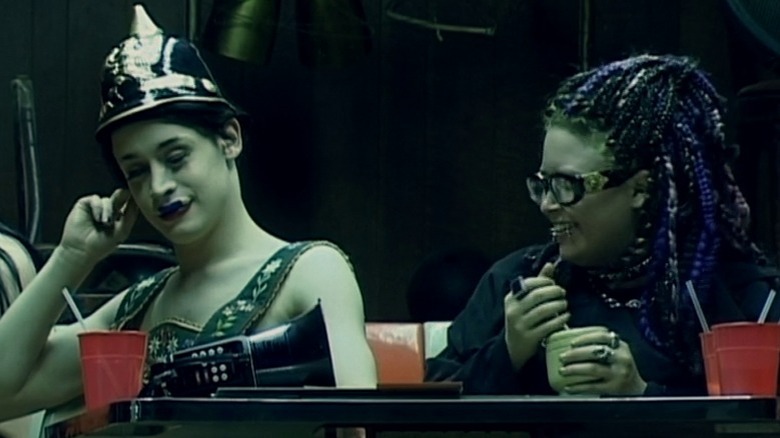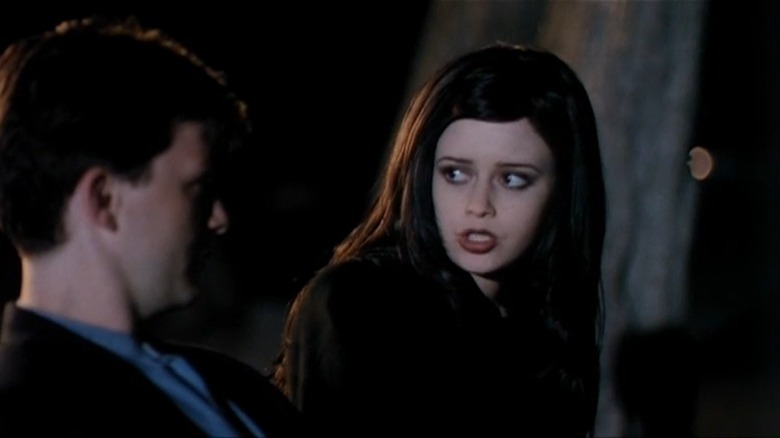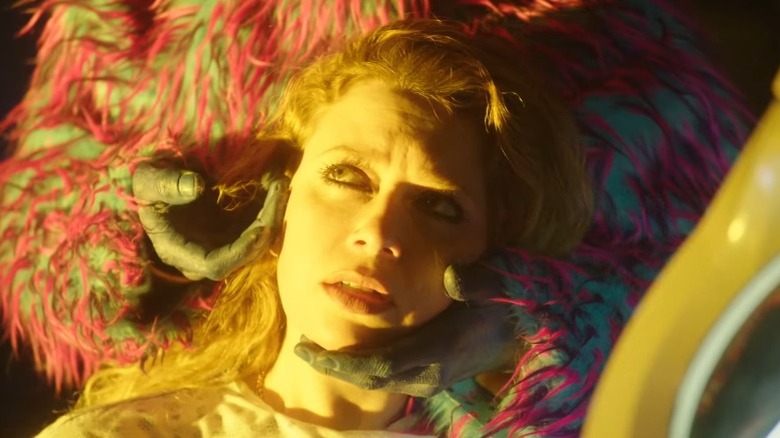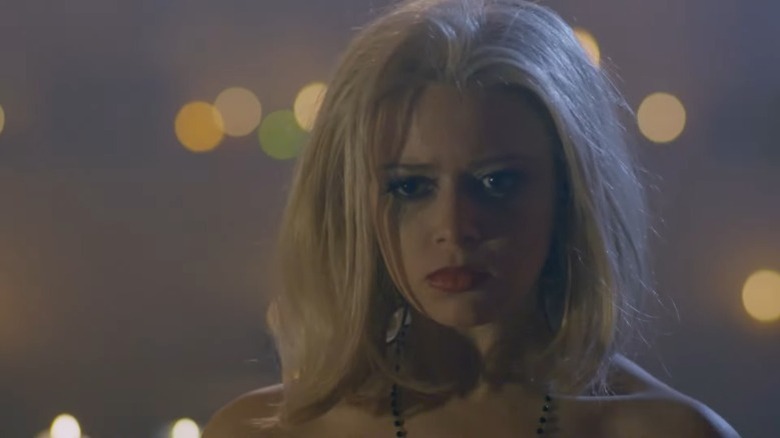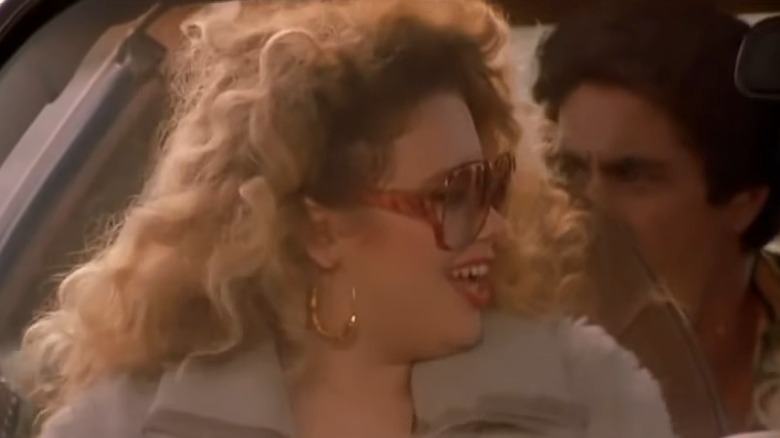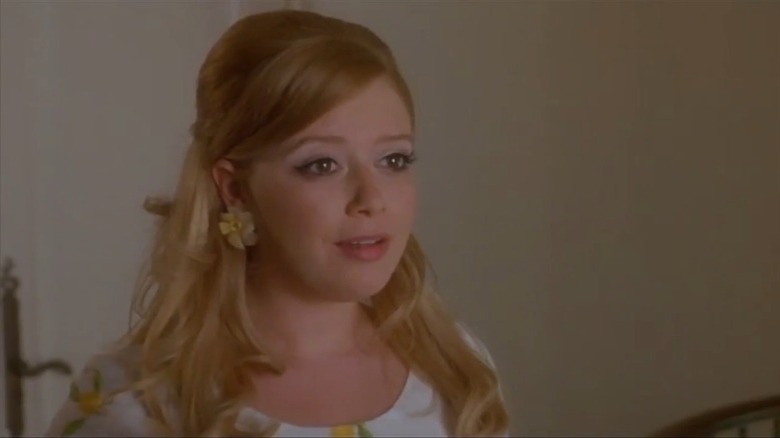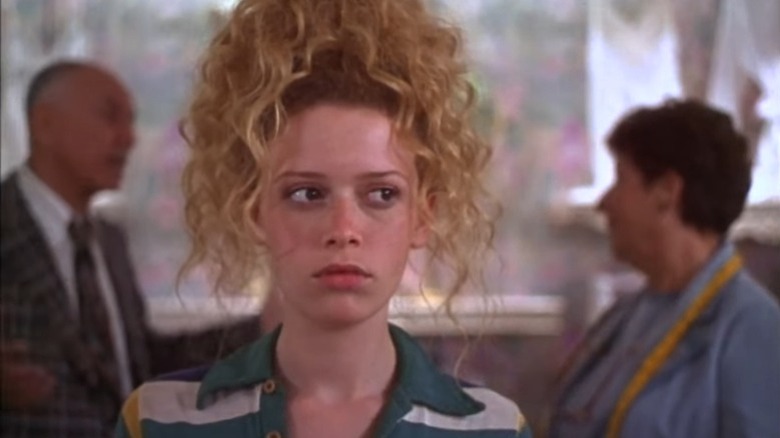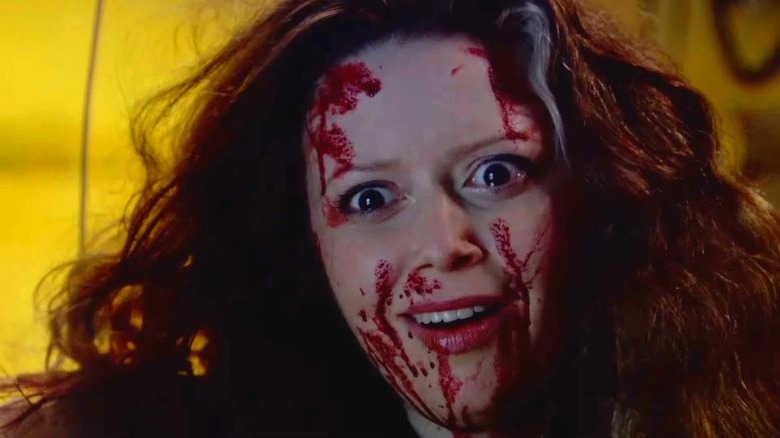The 12 Most Underrated Natasha Lyonne Movies & TV Shows, Ranked
Nowadays, Natasha Lyonne is a superstar. Following her highly popular roles on the Netflix hits "Orange Is the New Black" and "Russian Doll," and the ongoing success of Peacock's "Poker Face," the 44-year-old actress has never had a more massive or more international fan base. Even Time has surrendered to the Cult of Lyonne and named her one of the world's 100 most influential people. But, as any serious Lyonne fan knows, the story of her career is less one of frolicking in the winds of mainstream success than one of perseverance in their absence.
Although Lyonne is more identified with TV nowadays, she began her career as a totemic figure in the American indie film scene, and her work was singular for its prickliness. Many of the best and most beloved Lyonne films were originally critical failures, only to re-emerge years later as misunderstood underground classics, rediscovered by queer audiences, trash connoisseurs, and her ever-growing following. Calling her films "underrated" feels almost like a cliché at this point — which raises the question of which ones are the most underrated.
For the purposes of this list, "underrated" will refer both to the movies' critical reception and the degree of cumulative enthusiasm for them among film buffs, with the projects being ranked by the disparity between those quantities and their actual merit — not from worst to best, but from "least underrated" to "most underrated." They are, of course, all underrated to some extent; that's the Lyonne guarantee.
12. Addicted to Fresno
Depending on which definition you use, the most underrated film of Natasha Lyonne's career may also be her most iconic one — after all, while 1999's "But I'm a Cheerleader" became a widely celebrated queer classic over time, it was initially met with a scathing critical reception. But, since it's not 1999 anymore and it would now be a bit of a stretch to call "But I'm a Cheerleader" underrated within the context of Lyonne's filmography, this list will instead highlight another unjustly critically-panned collaboration that she made with director Jamie Babbit: 2015's "Addicted to Fresno."
While not Babbit's masterpiece, "Addicted to Fresno" deserved a much better shake than it got from reviewers and audiences at the time. A nasty dark comedy that's infused with much of the same droll self-awareness that marks the director's finest work, it stars the indie comedy dream team of Lyonne, Judy Greer, and Aubrey Plaza. The story is about Martha (Lyonne), a happy-go-lucky lesbian hotel maid who manages to get her sex addict sister Shannon (Greer) hired alongside her, only for the two to find themselves in a pickle when Shannon is accidentally responsible for a man's death. Featuring the likes of Clea DuVall, Allison Tolman, Kumail Nanjiani, and Molly Shannon in supporting roles, the film has an abrasive, borderline aggressive sense of humor that may not be to every viewer's liking, but those that vibe with it should come out thoroughly satisfied and outraged at its relative obscurity.
11. Jelly
The numerous queer roles played by Natasha Lyonne over the years have run the gamut from Netflix-level mainstream to the kind of obscure that only devoted fans ever seem to brave. And one such example of a woefully underseen Lyonne vehicle is 2010's "Jelly."
Largely designed as a modernized John Hughes send-up, "Jelly" stars Sarah Louise Wilson as Jelly Woods, a young romantic idealist who places all of her life's value into love — a precarious emotional circumstance that comes back to bite her when her boyfriend Luke (Jason Alan Smith), the would-be love of her life, unceremoniously dumps her. With her life left in shambles, Jelly begins a journey of self-rediscovery aided by her best friend and confidante, Mona Hammel (Lyonne). If you think the prospect of Lyonne in the Annie Potts "Pretty in Pink" role sounds enticing, you'd be right; even though Lyonne is not the protagonist, her charisma burns through the screen every time she appears, adding a welcome dose of queer wit to a charming little throwback love story.
10. My Suicidal Sweetheart
Upon watching it, you'd be excused for wondering whether "My Suicidal Sweetheart" — also known as "Max & Grace" during its festival run, and also known as "Crazy for Love" as of its DVD release — is a real movie or merely an inexplicably star-studded fever dream. This wholly unconventional dark romantic comedy, directed by Michael Parness in his only feature film effort, stands out even amid a filmography as peculiar as Natasha Lyonne's for its sheer conceptual absurdity. It's a cute, manic, 2000s-style rom-com by way of a typical plot-obstacle-laden road movie ... only the plot obstacles in question are suicide attempts.
Manifestly an effort to approach classic Hollywood love story tropes from a very different perspective, "My Suicidal Sweetheart" tells the story of Max (David Krumholtz), a patient at a mental institution who finds a reason to live for the first time when he meets the even more troubled Grace (Lyonne). The pair fall in love and resolve to escape and embark on a new life together — a project largely facilitated by Max's sheer force of will, as Grace would rather just die. Somehow, Lyonne and Krumholtz, along with an illustrious supporting cast including Rosanna Arquette, Lorraine Bracco, and Tim Blake Nelson in multiple roles (including, regrettably, a Native American man), make the whole thing work, finding both humor and genuine sweetness in their characters' emotionally extreme circumstances.
If you or anyone you know is having suicidal thoughts, please call the National Suicide Prevention Lifeline by dialing 988 or by calling 1-800-273-TALK (8255).
9. The Intervention
The pairing of Natasha Lyonne and Clea DuVall in "But I'm a Cheerleader" is one of the 1990s' great screen couples, and "The Intervention" would be plenty worth it just for the chance to see them together again after nearly two decades, in a radically different emotional and tonal context. But there's plenty of value in the film even beyond that tidbit of, let's say, lesbian historical interest.
DuVall's directorial feature debut, "The Intervention" centers on a weekend getaway attended by a close-knit friend group made up of four couples — Jessie (DuVall) and Sarah (Lyonne); Annie (Melanie Lynskey) and Matt (Jason Ritter); Lola (Alia Shawkat) and Jack (Ben Schwartz); and Ruby (Cobie Smulders) and Peter (Vincent Piazza). Ruby and Peter's marriage has been on the rocks for a while, and, during the trip, they learn that the entire premise of the "getaway" has been just an elaborate excuse arranged by their friends to stage an intervention. Soon enough, it emerges that all four couples are dealing with crises of their own, with Lyonne's Sarah feeling anxious about her girlfriend's resistance to moving in together even after three years.
Part light comedy, part studious interpersonal drama, "The Intervention" is a minimalist yet incisive example of that increasingly rare brand of low-budget, character-driven ensemble film that used to be everywhere when Lyonne and DuVall first broke out into the American film world. Any Lyonne fan would do well to give it a shot.
8. Party Monster
There are few contemporary entertainers more associated with the New York City art kid scene than Natasha Lyonne. So, there is perhaps some cosmic inevitability to the fact that she is one of the principal cast members in a controversial film that became a certified cult classic for its depiction of the Big Apple's underground nightlife: Fenton Bailey and Randy Barbato's "Party Monster."
Released in 2003 to woeful box office returns and even more woeful reviews, "Party Monster" is a riotous crime biopic about the rapid rise and gruesome fall of legendary party promoter Michael Alig — played here by Macaulay Culkin in his adult comeback role. Based on the memoir "Disco Bloodbath" by Alig's real-life friend and associate James St. James, the film tells of the process by which Alig, aided by St. James (Seth Green), became the king of the New York City "Club Kids" throughout the 1980s and 1990s, only to spiral into a hallucinatory frenzy of hedonism, drug abuse, and, eventually, violence. Lyonne co-stars as Brooke, one of the Club Kids who join Alig's posse — a character based on real-life Dallas club mogul Brooke Humphries. And, although the film was largely rejected by audiences at the time, viewers with a taste for the kind of noisy, colorful, disco-tinged anarchy it chronicles eventually found in it a singular, subversive queer masterwork — which, as you may have noticed by now, is something of a pattern on this list.
7. The Auteur Theory
It really is hard to understate Natasha Lyonne's importance to American indie cinema. She's worked diligently and consistently enough, with a varied enough roster of underappreciated directorial talents, that even her most inveterate fans have trouble keeping up with all the deep pockets of riches in her resume. For instance, a film like "The Auteur Theory" is just the kind of clever, meta-reflexive postmodernist indie that should by all accounts have become a film student favorite — all the more so given that it's actually about film students. Yet, it sits largely undiscovered in Lyonne's filmography.
Well, here's hoping that changes. This endlessly amusing comedic whodunit from director Evan Oppenheimer qualifies as the rare instance of an industry-insider film that offers just as many rewards to casual viewers as to those in the know. Set at a student film festival where directors start getting mysteriously murdered one by one, "The Auteur Theory" divides its time between observing the clashing egos and hacky creations of the would-be artistes in attendance (viciously parodying student films of various shapes and forms) and following British documentarian George Sand (Alan Cox) as he attempts to find out who the killer is. Lyonne plays Rosemary Olsen, the most suspicious of all the festival's attendees, and makes the most of every scene she's in — just as you'd expect of a performer who's been hanging out in indie film festivals all her life.
6. Antibirth
For how storied and varied her career is, Natasha Lyonne hasn't done a lot of straight-up horror — either in film or on television. But "Antibirth" alone is enough to attest to her mettle as a scream queen. A film possessed with that sense of grungy, seedy unease that only indie horror can muster, it combines body horror and no-holds-barred surrealism into an experience that's brutally tactile, overwhelmingly bizarre, and entirely impossible to imagine being led by any other actress.
Lyonne stars as Lou, a stoner and party freak from a destitute rural community in Michigan, who wakes up after a particularly wild function at an abandoned warehouse to find herself experiencing symptoms of pregnancy — even though she hasn't slept with anyone in a year. As whatever bizarre illness has instilled itself in Lou's body begins to spread, she starts to uncover an elaborate, potentially supernatural conspiracy involving her friend Sadie (Chloë Sevigny, without whom a film like this would not be complete), Sadie's drug dealer boyfriend Gabriel (Mark Webber), and a mysterious woman from out of town named Lorna (Meg Tilly).
The brainchild of writer and director Danny Perez, "Antibirth" received a mixed-to-positive critical reception upon release and remains relatively underseen. But it is an absolute must-watch, not only for Lyonne fans — who will find her giving one of her most impassioned, intense, and charismatic leading performances — but for any and all gorehounds, especially those with a taste for the psychedelic.
5. Freeway II: Confessions of a Trickbaby
Another instance of an initially panned Natasha Lyonne vehicle that went on to be reappraised and become a veritable cult classic — really, that could be an entire video rental store section — is 1999's "Freeway II: Confessions of a Trickbaby." The sequel-in-name-only to the 1996 Reese Witherspoon movie "Freeway," it is an exploitation film much like its predecessor, written and directed by the same Matthew Bright, and sharing the same "loose reimagining of a fairy tale" conceit (in this case, of "Hansel and Gretel"). Otherwise, it's a completely independent project with its own self-contained story, which is to say that it's very much worth watching even if you've never seen "Freeway."
The film's protagonist, Crystal "White Girl" Van Meter, is a 15-year-old prostitute who escapes from juvenile prison alongside Angela "Cyclona" Garcia (María Celedonio), a 16-year-old serial killer, and embarks with her on a road trip to Mexico. The result of that team-up is about as bombastically chaotic, violent, and squalid as you might expect, with all the trashy fun any fan of the era's exploitation films could possibly ask for; you can practically feel the mold break off the VHS tape as you watch. But it's the film's John Waters-esque sense of cackling reverence for its amoral anti-heroines that really makes it special, and it's just as well that said reverence is directed towards Lyonne, who could already light up the screen even at 19 years old.
4. Detroit Rock City
"Detroit Rock City" is arguably one of the last true examples of the "rock movie," such as it is — a sincere, proudly corny concoction that could not have been the product of any era but the late '90s. It also belongs to the somewhat less storied tradition of rock movies tied to the work of specific bands; depending on who you ask, this is still frequently known as "the Kiss movie," after all. But "Detroit Rock City" is by no means a Kiss fans-only event, as evidenced by its — you guessed it — cult classic status even among the group's skeptics.
Although the plot is centered around the efforts of a group of four teenage friends to get into a Kiss concert in 1978, "Detroit Rock City" is really much more of a wide-ranging cauldron of cultural reminiscence, featuring the music of various 1970s icons. The boys are played by Edward Furlong, Giuseppe Andrews, James DeBello, and Sam Huntington, but, in the film's generous, expansive vision of the era's musical fandom, the girls also play a prominent part. Along with Melanie Lynskey as Beth Bumstein, Natasha Lyonne plays one of the two characters whose names are directly lifted from Kiss songs: Christine, after the Gene Simmons-penned "Christine Sixteen." A disco fan who decides to dump her boyfriend and join the boys' party following a road rage incident, Christine brings one of the many unique perspectives that render the film's version of rock nostalgia as a thrillingly rich mosaic.
3. Die, Mommie, Die!
Out of all the deliriously fun, deliriously campy, deliriously gay projects that Natasha Lyonne's career is peppered with, "Die, Mommie, Die!" deserves plaudits for being maybe the single gayest. And, in addition to that, it is certainly one of the most fun.
The campiness begins with the premise: a spoof of 1960s psycho-biddy flicks, complete with all the garish, decadent glamour of crepuscular classic Hollywood. Then there's the fact that the entire film is a vehicle for prolific American thespian and drag queen Charles Busch — based, as it is, on Busch's eponymous stage play, which originated from an effort to adapt Sophocles' "Electra." Much like its theatrical source, "Die, Mommie, Die!" follows Angela Arden (Busch), a fading lounge singer trapped in a loveless marriage to film producer Sol Sussman (Philip Baker Hall), who one day decides to poison her husband so she can be with her young fling, Tony Parker (Jason Priestley).
That's where the film's "Electra" inspiration comes in, as does Natasha Lyonne, who plays Angela's hateful daughter Edith. Aided by her basket case gay brother Lance (Stark Sands), Edith hatches an elaborate revenge plan against her mother, leading to consequences about as dire as those in a Greek tragedy, yet depicted with considerably less portent. Filled with actors who seem preternaturally ordained for their roles, "Die, Mommie, Die!" finds Lyonne giving one of her most entertaining performances ever, in an homage to 1960s trash cinema both hilariously perceptive and irresistibly sincere.
2. Slums of Beverly Hills
You'd think that the breakthrough film of an auteur as respected as Tamara Jenkins would be the exception on this list and actually have some contemporaneous adulation to show for it, but even "Slums of Beverly Hills" wasn't originally met with as much acclaim as it ought to have been. Although reviews for this 1998 indie dramedy were largely positive — certainly more so than many entries on this list — they still didn't quite do justice to the fact that this is one of the best movies of the 1990s and one of the best coming-of-age films ever.
Nowadays, of course, Jenkins' searing semi-autobiographical portrayal of a rickety working-class nomad family is duly recognized as a high point in the careers of all involved. Yet unlike, say, "But I'm a Cheerleader," it still belongs high on a list of underrated Natasha Lyonne films, simply due to the fact that it remains so criminally underseen and under-discussed for a movie of its stature. Never mind the enormous authenticity on display, ensured by the rigor with which Jenkins pulls from her compendium of life experiences to depict a highly specific corner of the world in breathtaking close-up; "Slums of Beverly Hills" would be a great movie just for the space and opportunity it affords Lyonne. In her breakthrough film performance, she does such stunningly mature, yet convincingly vulnerable, work as put-upon teen girl Vivian Abromowitz that she'd still be a legend even if she had never made another film.
1. All About Evil
Although "Slums of Beverly Hills" is probably the straight-up best film on this list, the title of "most underrated" Natasha Lyonne flick has to go to an essential tome in her oeuvre that nonetheless remains revoltingly obscure to the general public thanks to an array of distribution woes. That is 2010's "All About Evil."
So underrated is this film that the most common response it seems to elicit in viewers who happen upon it is an exasperated "How have I never heard of this before?" Indeed, how isn't the world talking about "All About Evil" all the time? It's got everything: killer women, Victorian frocks, metafictional humor, high camp, low camp, drag queens, Elvira, Mistress of the Dark, bountiful horror history references, buckets of old-school gore, and even Mink Stole. The premise alone should be enough to get anyone giddy: Lyonne as Deborah Tennis, a shy librarian and rundown theater operator who begins to make snuff films and show them to patrons to keep the business afloat, all while pretending to be just an up-and-coming horror cineaste.
If "Antibirth" was a case for Natasha Lyonne, scream queen, "All About Evil" finds her relishing the role of the ax murderer. The gusto with which Lyonne inhabits Deborah's unorthodox self-actualization is a joy to behold; it's arguably the crowning campy achievement of a career filled with go-for-broke dedication, headlining what may be the most gloriously Natasha Lyonne-y film that she has ever made.
